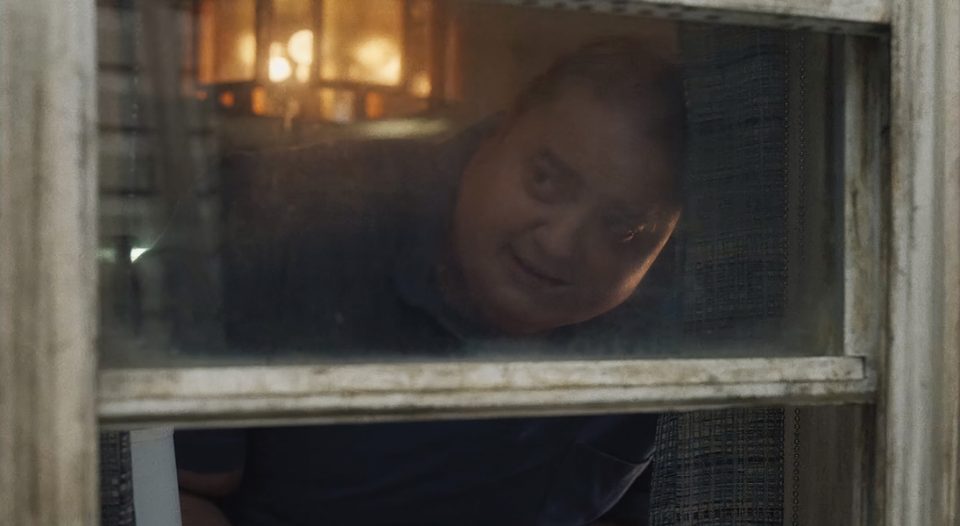This review contains spoilers.
So many conflicts in modern Christendom and the world at large revolve around the human body and our conduct toward it that one might reasonably look forward to leaving that body behind for a little peace and quiet. The apostle Paul was particularly enamored with the idea of bugging out entirely: in his letter to the Romans he explains, “Our old self was crucified with [Christ] so that the body ruled by sin might be done away with, that we should no longer be slaves to sin” (6:6 NIV).
This idea of the body as a burden shapes the spiritual questions at play in Darren Aronofsky’s harrowing new drama The Whale. The film’s good-hearted protagonist, Charlie (Brendan Fraser), is morbidly obese and needs a walker to get around his dark, claustrophobic apartment somewhere in the middle of Idaho. A chain hangs from his bedroom ceiling so he can pull himself out of bed each morning. He teaches online college courses in English composition but is too ashamed to turn on his laptop camera; on a conference call with students, he sits among their curious young faces as a black rectangle.
Adapted from an award-winning play by Samuel D. Hunter, who grew up gay in a conservative Christian community in Idaho, The Whale unfolds as both a sincere expression of faith and a rant against organized religion. Championing faith is Tom (Ty Simpkins), a young doorbell missionary who arrives at Charlie’s apartment when the latter is suffering a heart seizure and manages to calm him. Excoriating Tom and his end-times theology is Liz (Hong Chau), a worn-out registered nurse who lives nearby, dearly loves Charlie and looks in on him because he has no insurance.
The clash between Liz and Tom animates much of the movie as the missionary tries to save Charlie’s soul and the nurse tries to get him to seek medical attention. An Asian orphan adopted by white Christians, Liz grew up in the New Life Church, the same faith Tom now extols, but rejected it as a teenager. “You’re young,” Liz marvels. “Why the hell would you want to believe that the world is about to end?” With utter sincerity Tom replies, “I believe that when Christ returns, it’s gonna be beautiful.” Liz just rolls her eyes. There’s something sketchy about Tom; he claims to come from a small congregation in Ohio, but as Liz wonders, what church sends a missionary to Idaho?
Some Christians might be annoyed that their representative in The Whale embraces such an extreme version of the faith, yet the idea of time running out for humanity harmonizes pretty well with Charlie’s situation. As Liz informs him, his blood pressure is 238 over 134 and he’s suffering from congestive heart failure—if he doesn’t go to a hospital, he’ll be dead in a matter of days. Charlie responds to this news with a shrug and digs into his bucket of KFC.
At the bottom of that grease-stained bucket lies terrible grief. When Liz catches Tom paying Charlie a second visit, she pulls the young man out onto the porch to explain her relationship with Charlie. Her older brother, Alan, was one of Charlie’s English students at the local college, and the two fell in love. After Charlie left his wife and 8-year-old daughter to take up with Alan, the church expelled Alan and his father renounced him, which eventually drove her brother to suicide. “To this day, my dad won’t admit it,” she tells Tom. “Told the whole congregation Alan’s death was just an ‘unfortunate accident.’ Denying him to the end.”
Adapted from an award-winning play by Samuel D. Hunter, who grew up gay in a conservative Christian community in Idaho, The Whale unfolds as both a sincere expression of faith and a rant against organized religion.
This revelation casts Charlie’s gluttony in a new light: his lover gone, his relationships with his wife and child shattered, he is purposely eating himself to death. From Tom’s perspective, nothing can help Charlie now but the gospel. “God hasn’t turned his back on you,” Tom promises him. “If you accept him, he’ll release you from this. He’ll take your soul out of this body and give you a brand-new body. One made of pure light.”
Charlie isn’t about to accept any God who would condemn his relationship with Alan, and as it turns out, Alan was way ahead of Tom in recognizing the body as a cage. During one of Tom’s visits to the apartment, he ventures into Charlie and Alan’s old bedroom—which Charlie has carefully preserved—and finds Alan’s dog-eared Bible. Thumbing through it, he lands on Romans 8, the place marked with a photo-booth strip showing the couple in happier times. The page is marked up, and one passage has been highlighted in gold:
Therefore, brothers and sisters, we have an obligation—but it is not to the flesh, to live according to it. For if you live according to the flesh, you will die; but if by the Spirit you put to death the misdeeds of the body, you will live (8:12-13 NIV).
As a filmmaker, Aronofsky is well-acquainted with the weight of the human body: The Wrestler (2008) starred Mickey Rourke as a scarred, washed-up fighter, and Black Swan (2010) followed Natalie Portman’s character through the punishments of professional ballet. The Whale never looks away from Charlie’s obesity or what it means for him physically or emotionally. When his daughter, now 17 and exploding with rage and recrimination, demands to know why he was never part of her life, Charlie answers with a leveling stare: “Look at me. Who would want me to be part of their life?”
Fraser’s unerringly sweet and vulnerable performance as Charlie has been nominated for an Academy Award, and it brightens a drama steeped in darkness, wracked with anguish and battling the narrow parameters of its stage source. Charlie is no Christian—he’s read the entire Bible twice and finds it “devastating”—but more than any other character in The Whale, he understands the imperative of freeing the soul from the body. With his fate drawing near, he sends his students an expletive-laden email instructing them to throw away their assignment and simply write him something honest.
This gets him fired, yet he’s able to meet his students for one last conference call, where he commends them for their responses and, as a reward, finally reveals himself on camera. Aronofsky zooms in slowly on the conference call grid, slowly enough to capture the faces of Charlie’s students as they react with shock, concern and, in one case, casual cruelty, snapping a cellphone picture of him. “These assignments don’t matter,” Charlie tells them, his face filling the screen. “This course doesn’t matter. College doesn’t matter. These amazing, honest things that you wrote? They matter.”
Will Charlie get his body of pure light, as Tom promises? The New Testament is full of such imagery. “Once you were darkness, but now in the Lord you are light,” Paul writes to the Ephesians. “Live as children of light” (5:8 NRSV). Preaching after his arrival in Jerusalem on Palm Sunday, Jesus tells the crowd, “While you have the light, believe in the light, so that you may become children of light” (John 12:36). One of the ironies of The Whale is that Tom—the evangelist, the true believer—turns out to be more troubled, complex and compromised than he first appears. Like Charlie, he’s only a container.





